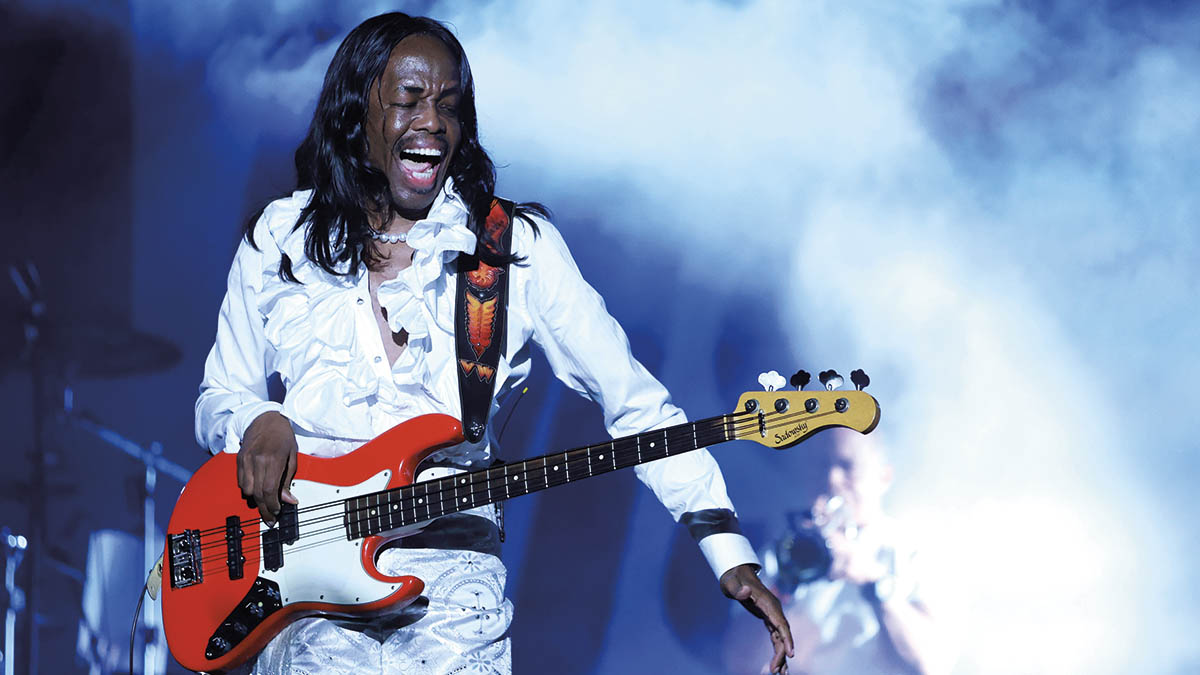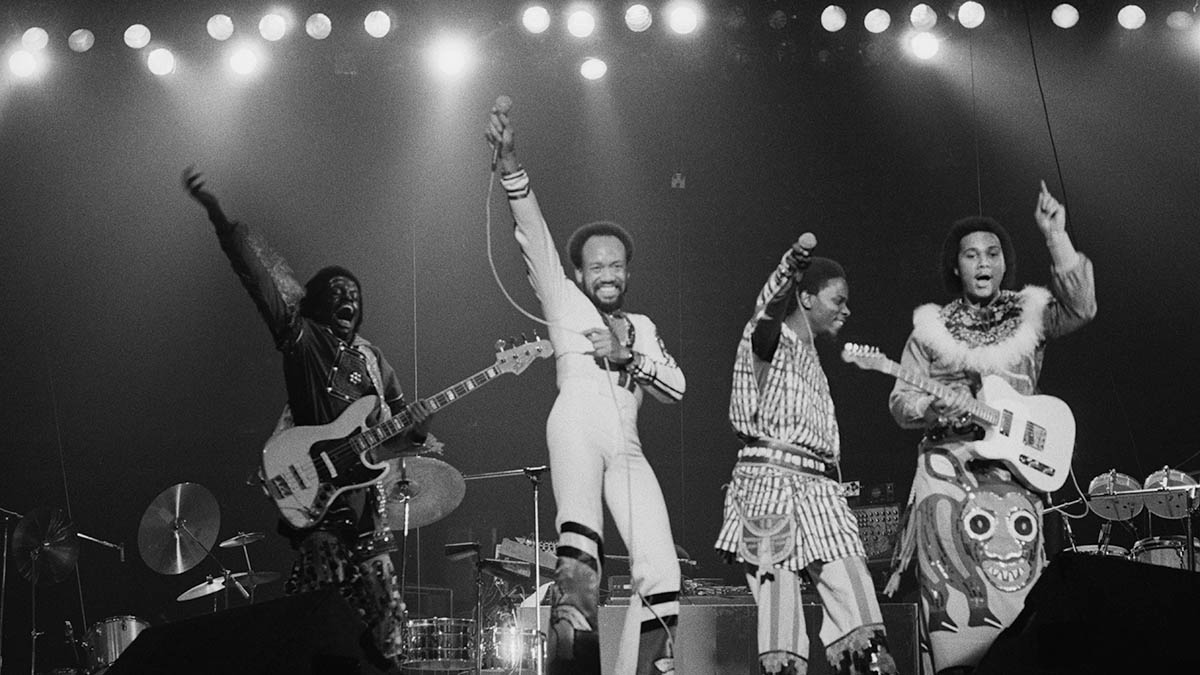Verdine White: “Apart from the drums, the bass is the instrument you need to play the longest to become truly funky”
In this classic interview from 2004, the Earth, Wind & Fire legend reveals the secret of funk and explains why he's never used a pick

There’s no arguing with Verdine White. Now 70, but with the energy of a bassist half his age, he’s seen it all. Back in 2004, we asked him about his bass philosophy, and specifically about funk, and he went into a friendly diatribe about how important it is to get the feel right, as well as the evils of picks, the usefulness of a classical education, and a highly unlikely influence from the north-west of England.
What is the essence of funk for a bassist?
“You just feel it. The key is to try and hold the groove down, particularly if you’re in a big band. That’s what a bass player does. The way to learn to play funky is to listen to a funky drummer – they have a lot to do with it, too. The bass is the instrument you need to play the longest, apart from the drums, to become truly funky.”
Do you find that you improve as a bass player as you get older?
“Absolutely. I’m still learning, and I think my playing is better now than it’s ever been. It’s certainly more consistent than it’s been for years. I hear better, I feel better, I understand all forms of music now. My bass playing isn’t as egomaniacal as it was. At the beginning, I just wanted to hear bass, but now I wanna hear where it fits in with the right stuff.”
What bass guitars do you use?
“Right now I’m using a Roger Sadowsky bass. It has a great fretboard and I use Roger’s pickups. It’s the Rolls-Royce of basses. It’s what Fender would have sounded like if [Leo] Fender had stayed in business: a bass for bass players. It requires skill, because it fights back.
Get The Pick Newsletter
All the latest guitar news, interviews, lessons, reviews, deals and more, direct to your inbox!
“You know how if you’re an amateur pianist and you play a Steinway? You find out how good you’re not! My bass is like that. I also have a white Yamaha TR4 which sounds fabulous: Yamaha make them for me in Japan. No, I’m not scared to take them on a plane – my technicians handle them pretty good.”
What tuning do you use?
“I tune to A440, depending on what the keyboards are doing. A440 is relative to the person, you know! I change my strings every show. I have some black strings that Raphael Saadiq gave me. They really sound great.“
Fingers or pick?
“I’ve never used a pick.”
You’ve never tried?
“I’ve never, ever tried. The great bass players don’t need picks... Yes, that is controversial. You can get into big arguments with that one.”
Do you indulge in five- and six-strings?
“I like fours, although I do have two fives at home. Fours are a little bit better for my imagination. Five-strings are good for the low octaves, but my basses have enough of those on them, and sixes are really if you want to do more harmonic stuff.”

Do you use effects?
“Maybe just a little bit, a flanger here and there. A double octaver, depending on what the song is. I like a real clean sound, a precise sound, you know. My tuning is impeccable, because bass is probably the hardest instrument to get consistently right when you’re playing live, because they don’t really make rooms for bass.
“You have to treat a bass really good. My tech works on the bass for like an hour and a half before each show – he’s walking around the venue, making sure that it sounds good. If it’s a really booming room, I might not kick the volume as loud, for example.”
What’s your recording setup?
“I like to go direct as well as through an Ampeg B-15. I’ll usually use a mixture of both sounds when it comes to the final cut. I use a Sadowsky preamp to warm it up, too. I used it on Jennifer Lopez’s album This Is Me... Then [2002]. It makes it so you don’t have to work so hard in the mix.”
Do you play fretless?
“A little bit. I’m not big on fretless – it’s good, but I don’t really need one. It’s basically what they tried to make an electric upright into. I started on upright. I was a classically trained bass player, originally – I played with several orchestras, including the Chicago Symphony.”
How does a background on upright help you as an electric bassist?
“Well, when I started in the early '60s as a teenager, that was what you did. It was great training – obviously it was good for my technique. It taught me to follow a beat and to be disciplined on the bass.
“It also helps you with hand positions, control of fingering, controlling the bass itself, being able to play precisely with other musicians, chord changes... because in order to play the upright bass you’ve really got to play it, know what I mean? You’ve got to be good to play it. It also gives you a strong grip, which is good for me because I have really small hands for a bass player.”
Which other players do you admire?
“Ron Carter, Marcus Miller – a good friend of mine – Stanley Clarke, Nathan East, Christian McBride. We’re all buddies, you know.”
Who were your influences?
“I love Paul McCartney and the way he picked up the bass and used it to accompany him for songwriting, particularly on Sgt. Pepper’s. Lucy In the Sky With Diamonds is a great bassline. Especially when he went out on the vamp, you know? He had such a warm, rounded sound.”
People don’t realise how great a bass player McCartney really was. Think about it – he’s been playing from the '50s until now, and he’s done some of the best bass work ever
I love the octave fills before the main riff in Paperback Writer.
“Yeah! [hums bass lick] He’s underrated as a bass player. People don’t realise how great a bass player he really was. Think about it – he’s been playing from the '50s until now, and he’s done some of the best bass work ever. It’s funny the way that George Harrison said he was going to play guitar, so Paul just had to go to bass.
“Also I like Sting, who is very hip, and James Jamerson at Motown. Fabulous player. Also John Entwistle, although he was a rocker, and most of the guys I admire were the urban guys, you know. Also I did a benefit gig for Magic Johnson in LA recently, and Pino Palladino sat in. A great bassist!”
Joel McIver was the Editor of Bass Player magazine from 2018 to 2022, having spent six years before that editing Bass Guitar magazine. A journalist with 25 years' experience in the music field, he's also the author of 35 books, a couple of bestsellers among them. He regularly appears on podcasts, radio and TV.
“I asked him to get me four bass strings because I only had a $29 guitar from Sears”: Bootsy Collins is one of the all-time bass greats, but he started out on guitar. Here’s the sole reason why he switched
“I got that bass for $50 off this coke dealer. I don’t know what Jaco did to it, but he totally messed up the insides!” How Cro-Mags’ Harley Flanagan went from buying a Jaco Pastorius bass on the street to fronting one of hardcore’s most influential bands


![John Mayer and Bob Weir [left] of Dead & Company photographed against a grey background. Mayer wears a blue overshirt and has his signature Silver Sky on his shoulder. Weir wears grey and a bolo tie.](https://cdn.mos.cms.futurecdn.net/C6niSAybzVCHoYcpJ8ZZgE.jpg)

![A black-and-white action shot of Sergeant Thunderhoof perform live: [from left] Mark Sayer, Dan Flitcroft, Jim Camp and Josh Gallop](https://cdn.mos.cms.futurecdn.net/am3UhJbsxAE239XRRZ8zC8.jpg)






